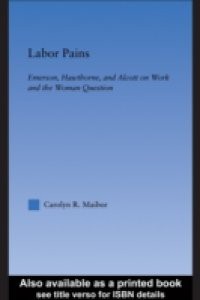This book exlplores the importance of work and its role in defining and developing the self. Carolyn R. Maibor illustrates the connection between the construction of a substantive self and the call for women to have increased access to the professions and higher education. According to Maibor, the writings of Ralph Waldo Emerson, Nathaniel Hawthorne and Louisa May Alcott demonstrate that valorizing the importance of work also validates the need for equality. Labour Pains challenges the traditional view of Emerson as being unconcerned with societal issues, and as growing more conservative over the course of his career. As critical attention to his concern with work reveals, Emerson remains interested in the importance of a meaningful connection between self and society. When he turns to the 'woman question' in the last decades of his career, most notably in his unpublished manuscript Discours Manque, it is this stress on the importance of work that presses him to develop his views. Labour Pains also uncovers surprisingly similar stances in Hawthorne and Alcott, and opens their work up to new interpretations.

